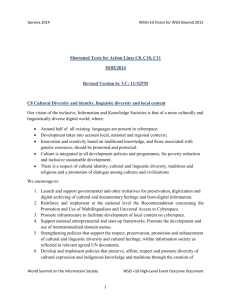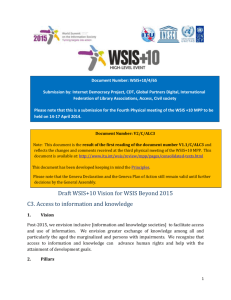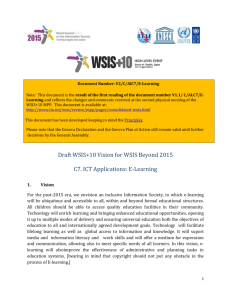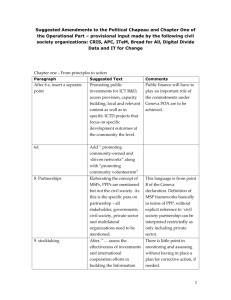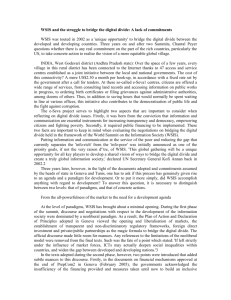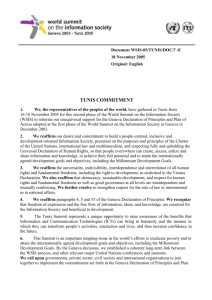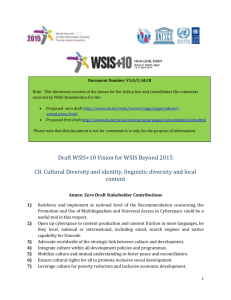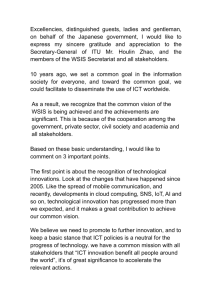For the third meeting, contributions should cover the draft
advertisement
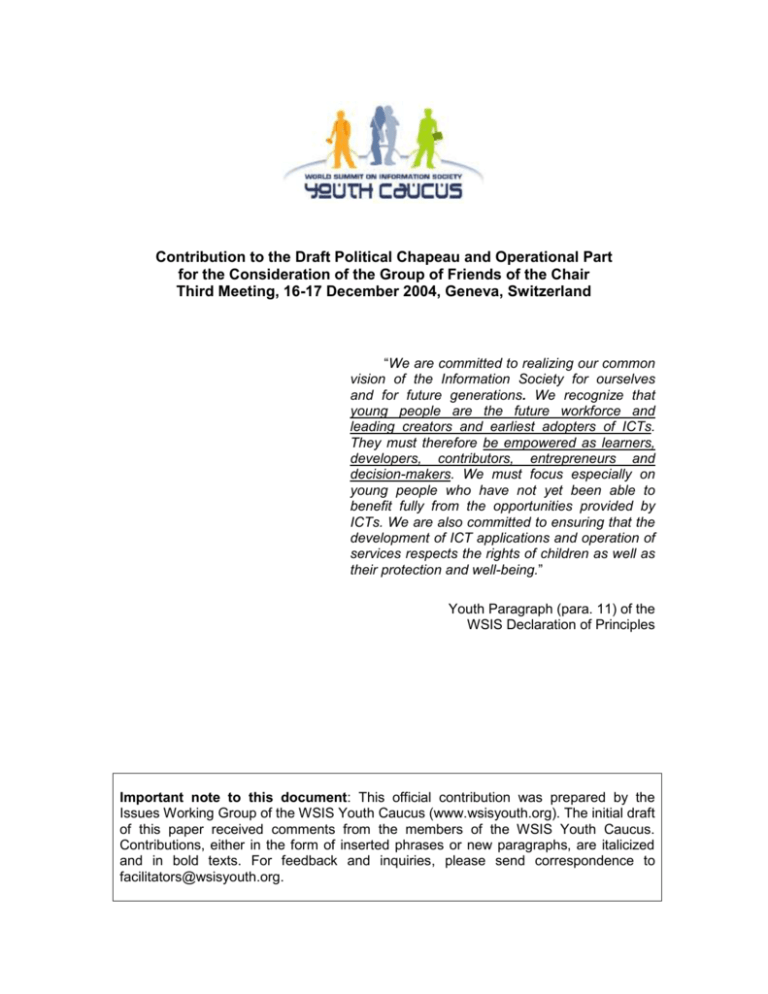
Contribution to the Draft Political Chapeau and Operational Part for the Consideration of the Group of Friends of the Chair Third Meeting, 16-17 December 2004, Geneva, Switzerland “We are committed to realizing our common vision of the Information Society for ourselves and for future generations. We recognize that young people are the future workforce and leading creators and earliest adopters of ICTs. They must therefore be empowered as learners, developers, contributors, entrepreneurs and decision-makers. We must focus especially on young people who have not yet been able to benefit fully from the opportunities provided by ICTs. We are also committed to ensuring that the development of ICT applications and operation of services respects the rights of children as well as their protection and well-being.” Youth Paragraph (para. 11) of the WSIS Declaration of Principles Important note to this document: This official contribution was prepared by the Issues Working Group of the WSIS Youth Caucus (www.wsisyouth.org). The initial draft of this paper received comments from the members of the WSIS Youth Caucus. Contributions, either in the form of inserted phrases or new paragraphs, are italicized and in bold texts. For feedback and inquiries, please send correspondence to facilitators@wsisyouth.org. Political chapeau / Tunis Commitment Idea Introductory text Text 1. 2. We, the representatives of the peoples of the world, have gathered in Tunis from 16-18 November 2005 for this second phase of the World Summit on the Information Society to continue the work begun in the first phase, Geneva, 10-12 December 2003. One Summit, in two phases, provides a unique occasion for the global community to address and act upon the challenges and opportunities of the emerging global Information Society in a comprehensive and inclusive manner, and to set the course towards ensuring that the benefits of new technologies, especially information and communication technologies (ICTs), are equitably available to all. Renewed commitment 3. We reiterate our unequivocal support for the Declaration of Principles and a Plan of Action adopted by the first phase of the Summit, and our resolve to uphold the principles and implement the commitments we agreed on in Geneva as part of a broad policy agenda addressing the profound social, political, cultural, environmental and institutional dimensions of change that the world is facing. Agreed elements of the Information Society 4. We reaffirm our common desire and commitment to build a people-centred, inclusive and development-oriented Information Society that would embody our common vision and agreed principles and commitments as set out in the documents adopted in Geneva while taking into consideration the diversity of each country and each region. 5. We recognize that ICTs—from basic radio and telephone services through advanced Internet technology, such as broadband platforms—are central for an emerging global Information Society that touches every aspect of our shared global agenda and the lives of our societies and citizens. 6. At the same time, we reaffirm that the Information Society is not all about technology. It is about empowering people and enhancing their participation in the economy and society. It is about using ICTs to support education and knowledge sharing, create sustainable livelihoods, advance business and social entrepreneurship, and access to health-care. 7. ICTs are not an end in themselves, but powerful tools to promote peace, security and stability, to support environmental sustainability, to enhance democracy, social cohesion, good governance and the rule of law. They can be used to promote economic growth and enterprise development through ICT-supported productivity gains and applied innovations. Infrastructure development, human capacity building, information and network security are critical to achieving these goals. Further commitments 8. We recognize that inclusiveness, respect for human rights and fundamental freedoms, freedom of opinion and expression, access to information and data, cultural and linguistic diversity and local content are fundamental to the Information Society. 9. We recognize that, to ensure that the benefits of the Information Society are more evenly distributed between and within societies, we must be particularly attentive to the roles of women and girls and to the needs of young people and older persons, persons with disabilities, indigenous peoples, minorities, and other marginalized and vulnerable groups such as the peoples of the Small Island Developing States. 10. We recognise that, in order to confront effectively challenges and threats resulting from malicious and abusive use of ICTs, we need to multiply our efforts in developing effective means of assuring information and network security without inhibiting our basic human rights. New Para. We recognize that sustaining commitments to the fruition of the Geneva Plan of Action, the global community and all stakeholders involved in the WSIS process should aim to reconvene in 2010 and 2015, coinciding with future 5-year reviews of the MDGs, in order to build new ICT for Development (ICT4D) partnerships and assess actions taken. The organization of a Global ICT4D Partnerships Forum and Fair must likewise be highly considered following immediately the Tunis Summit to spark new innovative ICT4D projects. Resource mobilisation, including human resources New Paras. We recognize the importance of multi-stakeholder partnerships in delivering and sustaining quality ICT4D projects. To this end, efforts aimed to increasing support to the “Digital Solidarity Fund” should be mobilized. We recognize that, to create sustainable digital opportunities for all, the education and training, especially of young people who are knowledge creators and leaders of peer-to-peer learning, in ICTs are essential ingredients, thus increased funding support to these areas must be pushed. Issues for Tunis 11. We have accomplished much since we first met in Geneva. We seek to reaffirm, enhance and strengthen the commitments already made by focusing on a thorough review of existing financial mechanisms for bridging the digital divide; and by investigating and making proposals for action on international Internet governance issues, as well as on the follow-up to the WSIS process, as referenced in chapters two, three and four of [this document / Operational document – “Tunis Plan of Implementation”]. Participation 12. We recognize that our goals can only be accomplished through the involvement and cooperation of all Information Society stakeholders, including governments, civil society, business entities, and international organisations. The two phases of this Summit have been enriched and have benefited from the high level of their involvement. 13. Indeed, this process has strengthened our partnership with all stakeholders, whose support and commitment are vital and indispensable for us to harness the potential of the Information Society for development and improving the lives of all our peoples. We are determined to ensure that the extraordinary participatory spirit and richness of initiatives that the WSIS process has generated continues after the Tunis phase. Policy framework National policies to achieve WSIS targets 14. We believe that an enabling environment, policy and regulatory frameworks, as well as effective national strategies are essential for all our countries and peoples to be able to benefit from the opportunities created by participation in the Information Society. We welcome the steps that many countries have already taken to achieve these goals and encourage other countries to enact similar efforts. New Paras. We encourage governments to craft national e-strategies based on outcomes of national multi-stakeholder platforms and broadbased civic consultation, and implement ICT4D projects that are community-driven and spread digital dividends to all. In this regard, young people, being at the forefront of ICTs and active in peer-to-peer skills sharing, have the most potential to contribute to national ICT policy processes and programme implementation at local, national and international levels. We further recognize that propagation of business and social entrepreneurship in the field of ICTs, in partnership with the private sector and civil society, should be high on the national estrategy agenda of governments. Benefits 15. We reaffirm our commitment to bridging, and eventually closing, the digital divide and to creating digital opportunities for all. We acknowledge the opportunities that ICTs—as tools for knowledge creation and information sharing—have to offer worldwide for sustainable development in an Information Society for all. 16. This Summit is an important stepping-stone in the world’s efforts to eradicate poverty and to attain the internationally agreed development goals of the Millennium Declaration. By agreeing in Geneva that the paramount focus of our efforts in building a global Information Society is harnessing the potential of ICTs to promote the development goals of the Millennium Declaration, we established a solid long-term link between the WSIS process, including its follow up and implementation, and other major United Nations conferences and summits. In this context, the outcomes of the recently concluded high-level plenary meeting of the General Assembly on review of the implementation of the Millennium Declaration are of special relevance. The WSIS process must be structured in a way that it contributes to the goals of the Johannesburg Plan of Implementation and the upcoming MDG+5 Summit. International, Norh-South and SouthSouth cooperation 17. Our efforts will be enhanced by international cooperation at all levels to improve coherence between national and international efforts for a truly global and concerted approach to sharing the benefits of the Information Society. Countries that have developed and implemented appropriate ICT policies should make efforts to provide and share useful knowledge and knowhow. Developed countries should take the lead in building the ICT capacities, from backbone infrastructure to human resource development, of developing countries, economies in transition and Small Island Developing States. SouthSouth ICT4D partnerships must likewise be strengthened. Conclusion 18. Yet, there is still much work to be done, and this work does not stop with the completion of the WSIS process. The emergence of the global Information Society to which we all contribute provides increasing opportunities for all our peoples and for the global community that were unimaginable only a few years ago. We must harness these opportunities and deliver on the promise of the information revolution. 19. We strongly believe that full and timely implementation of decisions we took in Geneva and in Tunis, and closely integrating this process in the overall strategy embodied in the Millennium Declaration is the way to achieve this goal. We therefore reaffirm our strong resolve to implement the Geneva Plan of Action and develop effective and sustainable responses to the challenges and opportunities of building a truly global Information Society that benefits all our peoples. Follow-up WSIS to Operational part of the final document / Tunis Agenda for Action We highly propose that the Operational Part be titled “Tunis Plan of Implementation” as it reflects a stronger commitment to put forward the Geneva Plan of Action. Idea Chapter one National implementation strategies Draft text From words to actions: A summit of sustainable solutions 1. We recognise that it is now time to move from words to actions, by taking the Plan of Action one step further, and identifying the areas in which progress has been made in implementing the commitments undertaken in Geneva, and by defining those areas where further efforts and resources are required. 2. We acknowledge the vital need, and we commit ourselves, to establish comprehensive, forward looking and sustainable national e-strategies, and to prepare related policies and to apply them appropriately, as an integral part of national development plans, poverty eradication strategies and MDG processes. Forging country-level ICT4D multi-stakeholder partnerships are very important in this respect. Regional and international implementation 3. We value regional integration efforts as a contribution to the development of the global Information Society, and strong cooperation within and among regions is indispensable. The regional dialogue should contribute to national capacity-building and to the alignment of national development strategies with the goal of implementing the Geneva decisions. 4. Exchange of views, the sharing of best practices and ICT4D research exercises are essential to implementing the Geneva decisions at the regional and international levels. Building a central depository of ICT4D and ICT policy knowledge resources is integral to capacity-building efforts. To this end, efforts should be made to provide and share useful knowledge and know-how, related to the elaboration of national e-strategies and policies. We encourage WSIS stakeholders to continue to organise and participate in ICT4D regional and international conferences, WSIS-related thematic meetings and ICT policy forums. These meetings and conferences must be inclusive and open to all interested parties. International co-operation 5. We reaffirm that only through the cooperation and joint action of all stakeholders will it be possible to succeed in our challenge of harnessing the potential of ICTs to promote the development goals of the Millennium Declaration and to continue improving the social welfare and development of all human beings. 6. We are committed to further strengthening the United Nations and the entire multilateral system of international relations, since we are convinced that a stronger multilateralism will consolidate measures in favour of sustainable development, poverty eradication and of international peace and security, which are crucial to building an Information Society. The United Nations system should play a genuine leadership role in promoting synergies and coherence of all efforts directed at expanding the developmental impact of ICTs. WSIS targets 7. We are committed to achieving the indicative targets, set out in the Plan of Action, that serve as global references for improving connectivity and access to and the use of ICTs in promoting the objectives of the Plan of Action, to be achieved by 2015, by doing the following: Modalities for implementation Crafting an enabling policy and regulatory environment supportive of ICT entrepreneurship. Creating digital opportunities through multistakeholder partnerships. Building the ICT capacities of people, especially young people and older persons, persons with disabilities, indigenous peoples, minorities, and other marginalized and vulnerable groups such as the peoples of the Small Island Developing States, through quality ICT education and training. Promoting community volunteerism in the ICT4D sector. Mainstreaming and aligning national e-strategies across national MDG action plans. 8. [There is a need to define modalities for the follow-up of the Tunis Summit and an eventual review of the WSIS-process. There is a need to align the development aspects of WSIS with follow-up and implementation of the internationally agreed development goals, including those contained in the UN Millennium Declaration.]* We encourage the international community to link post-Tunis review processes to future global MDG and Johannesburg Plan of Implementation follow-ups. Indicators 9. The Plan of Action identifies international performance evaluation and benchmarking as an important aspect of the follow-up and evaluation. We applaud the initiative of a number of key stakeholders involved in the statistical measurement of ICTs who have joined forces to create a global Partnership on "Measuring ICT for Development". This Partnership provides an open framework for coordinating ongoing and future activities in the area of Information Society measurements, and for developing a coherent and structured approach to advancing the development of ICT indicators globally, and in particular in the developing countries. Partnerships 10. We recognize that our goals can only be accomplished through the involvement and cooperation of all Information Society stakeholders. We encourage continuing co-operation between stakeholders to ensure effective implementation of the outcome of the WSIS-process, especially the promotion of Public Private Partnerships (PPPs) and Multi-stakeholder Partnerships (MSPs), in a joint effort and dialogue with less developed countries, donors and actors in the ICT sector. Stocktaking 11. We encourage all WSIS stakeholders to continue to contribute new and updated information on their activities to the WSIS stocktaking database, which was launched in October 2004 by the WSIS-ES and will be maintained by ITU, so that it becomes a valuable developmental tool, beyond the conclusion of the Tunis Phase of the Summit. Chapter two Financial mechanisms [for meeting the challenges of ICT for development] [to be discussed at December 15-16 GFC meeting] Proposal: Chapter three Inclusion of a review of the “Digital Solidarity Fund” and its potential as an innovative funding window for ICT4D projects must be highly considered. Internet governance [/ Internet-related public policy] [to be discussed following release of the final report of the WGIG] Comment: The UN WGIG must ensure that the relevant Internet Governance issues, which are important to and for young people, are addressed in its Final Report. The issues are: a. the increasing number of unsolicited commercial/bulk email or “spam”; b. data and information protection and network security vis-à-vis cyber-crime and cyber-terrorism and consumer safety; c. protection of personal privacy and other civil liberties in an Information Society; d. enhancement of linguistic diversity; e. promotion of Internet telephony or Voice over Internet Protocol (VoIP) and secured environment for e-commerce; f. advancement of freedom of expression vis-à-vis elimination of discrimination in all forms in the Internet; g. balance between government control/regulation and user censorship; h. innovation offered by wireless or mobile Internet (wi-fi); and i. proliferation of illicit, immoral websites such as those showing pornography in all its forms. Source: Official WSIS Youth Caucus Contribution to the Establishment of the UN WGIG, First Open Consultation Meeting, 20-21 September 2004, Geneva, Switzerland. Accessed from http://www.wgig.org/docs/wsis-youth-caucus.doc. Chapter four The way ahead 12. [There is a need to define clear steps for follow up after Tunis by defining the areas in need of follow up, the mechanism for follow up and the entities that will be tasked with the follow up.]* 13. We agree to institutionalize the WSIS follow-up mechanism and stocktaking within the framework of the United Nations and, on that basis, [to hold regular conferences to evaluate the implementation of the WSIS final documents]/[to examine implementation within the existing UN framework for regular review and follow-up mechanisms of major UN conferences and Summits].
